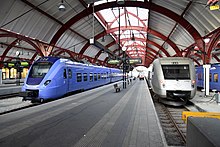| Sweden | |||||
|---|---|---|---|---|---|
 | |||||
| Operation | |||||
| National railway | SJ | ||||
| Infrastructure company | Swedish Transport Administration | ||||
| Major operators | Arlanda Express, Inlandsbanan, Krösatågen, VR Snabbtåg Sverige, Mälartåg, Norrtåg, Storstockholms lokaltrafik (SL), SJ, Snälltåget, Tågab, Vy Tåg, Pågatågen, Värmlandstrafik, Vy, Västtrafik, X-trafik, Øresundståg, Östgötapendeln[1] | ||||
| Statistics | |||||
| Ridership | 264.6 million[2] | ||||
| System length | |||||
| Total | 10,912 kilometres (6,780 mi)[3] | ||||
| Double track | 2,058 kilometres (1,279 mi)[3] | ||||
| Electrified | 8,186 kilometres (5,087 mi)[3] | ||||
| Track gauge | |||||
| Main | 1,435 mm (4 ft 8+1⁄2 in) standard gauge | ||||
| 1,435 mm (4 ft 8+1⁄2 in) | 10,846 kilometres (6,739 mi)[3] | ||||
| 891 mm (2 ft 11+3⁄32 in) | 66 kilometres (41 mi)[3] | ||||
| Electrification | |||||
| Main | 15 kV 16.7 Hz AC | ||||
| Features | |||||
| Longest tunnel | Hallandsås Tunnel (8.7 km) | ||||
| Longest bridge | Öresundsbron (7.8 km) | ||||
| Highest elevation | 601 m a.s.l. | ||||
| at | Storlien | ||||
| Lowest elevation | 30 m b.s.l. | ||||
| at | Stockholm City Station | ||||
| |||||
Rail transport in Sweden uses a network of 10,912 kilometres (6,780 mi), the 24th largest in the world.[3] Construction of the first railway line in Sweden began in 1855. The major operator of passenger trains has traditionally been the state-owned SJ, though today around 70% of all rail traffic consists of subsidised local and regional trains for which the regional public transport authorities bear responsibility.[4] Passenger traffic has increased significantly since the turn of the millennium,[5] and in 2019 Sweden ranked eleventh in the world (as measured in passenger kilometres per capita) and number three in the European union,[5] as well as number six in the world when measured by passenger share.
In 1988, driven by significant deficits at Swedish State Railways, the Swedish parliament pursued a separation strategy that involved partitioning the ownership of rail infrastructure from train operations. This move, which made Sweden the first European country to undertake such a separation, also involved opening the railway system to private train operators, including open-access operators, and introducing competitive bidding for regional service contracts. [6][7]
Sweden is a member of the International Union of Railways (UIC). The UIC Country Code for Sweden is 74.
- ^ Nelldal, Bo-Lennart, Andersson, Josef, Froidh, Oskar. (2018). Kungliga tekniska högskolan. Resandeflöden på Sveriges järnvägsnätAnalys av utbud och efterfrågan på tågresor TRITA-ABE-RPT-1818 URL: http://kth.diva-portal.org/smash/get/diva2:1251488/FULLTEXT01.pdf
- ^ "Railway passenger transport statistics" (PDF). Europa EU. 8 December 2019. Retrieved 9 January 2021.
- ^ a b c d e f "Bantrafik 2021" (in Swedish and English). 23 June 2022. p. Table 2.1. Archived from the original on 3 February 2023. Retrieved 28 August 2023.
- ^ Transportstyrelsen Resandeflöden på Sveriges järnvägsnät Analys av utbud och efterfrågan på tågresor (in Swedish TSJ 2019-2258. Website URL: https://www.transportstyrelsen.se/4978e1/globalassets/global/publikationer/marknadsovervakning/resandefloden-pa-sveriges-jarnvagsnat20190411.pdf
- ^ a b Eurostat (2021) Statistics Modal split of passenger transport. Data from 2019. https://ec.europa.eu/eurostat/databrowser/view/t2020_rk310/settings_1/table?lang=en
- ^ Spaven, David (November 1993). "Rail Privatization: the Swedish Experiment". Scottish Affairs. 1 (5): 87–95. doi:10.3366/scot.1993.0073. Retrieved 19 March 2019.
- ^ "Sweden, 30 years of railway liberalisation". Mediarail.be - Rail Europe News (in French). 2019-05-19. Retrieved 2024-01-23.
